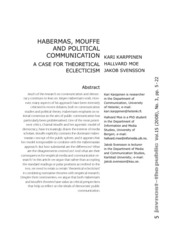Habermas, Mouffe and political communication. A case for theoretical eclecticism
Peer reviewed, Journal article
Permanent lenke
https://hdl.handle.net/1956/2801Utgivelsesdato
2008Metadata
Vis full innførselSamlinger
Sammendrag
Much of the research on communication and democracy continues to lean on Jürgen Habermas’s work. However, many aspects of his approach have been intensely criticised in recent debates, both in communication studies and political theory. Habermas’s emphasis on rational consensus as the aim of public communication has particularly been problematised. One of the most prominent critics, Chantal Mouff e and her agonistic model of democracy, have increasingly drawn the interest of media scholars. Mouffe explicitly contrasts the dominant Habermasian concept of the public sphere, and it appears that her model is impossible to combine with the Habermasian approach. But how substantial are the diff erences? What are the disagreements centred on? And what are their consequences for empirical media and communication research? In this article we argue that rather than accepting the standard readings or polar positions accredited to the two, we need to retain a certain “theoretical eclecticism” in combining normative theories with empirical research. Despite their controversies, we argue that both Habermas’s and Mouff e’s theories have value as critical perspectives that help us refl ect on the ideals of democratic public communication.
